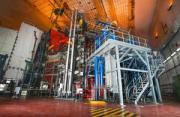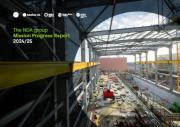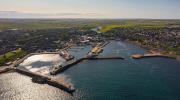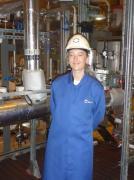Major Hazard Shrinks 20 Million Becquerels A Second
10th July 2011
"Significant progress" has been made to destroy one of the most hazardous legacies of Britain's nuclear research programme from the 20th century, according to the Nuclear Decommissioning Authority.
"Significant progress" has been made to destroy one of the most hazardous legacies of Britain's nuclear research programme from the 20th century, according to the Nuclear Decommissioning Authority. A clean-up operation funded by the NDA has destroyed more than half the liquid metal used as coolant in the experimental Dounreay Fast Reactor.
Its annual report published today describes the toxic sodium-potassium alloy it inherited in 2005 as the second biggest hazard in its �3bn-a-year clean-up mission. Some 57,000 litres remained inside the reactor when its decommissioning stalled in the 1980s.
A purpose-built chemical treatment plant commissioned by the NDA in 2009 has now destroyed more than half of it. The metal is so radioactive that its removal is bringing down radiation levels inside the reactor at a rate of 20 million becquerels a second.
The two-stage process involves chemical conversion and radiological decontamination to produce a salty water that is safe to discharge to sea. Designers thought the plant could decontaminate the metal by a factor of up to 1000.
But clean-up rates of up to 4 million have been achieved and the levels of radioactivity in the effluent are now at the limits of detection. "It has been phenomenally successful at hazard reduction," said Andy Swan, senior facility manager with contractor DSRL.
The plant currently is undergoing repairs to a valve that will keep it on course to destroy the bulk of the hazard by March next year. Fast reactors were the only reactors in Britain to use liquid metal instead of gas or water in the cooling circuits. Only two fast reactors were built, both at Dounreay in northern Scotland.
Related Businesses
Related Articles
TAE Technologies and UKAEA partner to commercialise fusion tech
Joint venture to develop neutral beams for fusion and non-fusion applications, creating high-skilled jobs and establishing a critical supply chain. TAE Technologies, a leading US private fusion energy firm with over 25 years at the forefront of scientific innovation, today announces a bilateral and reciprocal investment commitment with the United Kingdom's national fusion laboratory, the UK Atomic Energy Authority (UKAEA) to commercialise TAE's proprietary particle accelerator technology for the global market.
Buried Hazards, Unfinished Business - What the NDA's 2025 Progress Report Really Tells Us
The Nuclear Decommissioning Authority (NDA) has released its 2025 Mission Progress Report is a slightly sprawling document chronicling one of the UK's most complex environmental undertakings. The safe dismantling of its early nuclear legacy.
New recruit officers join the Civil Nuclear Constabulary
The Civil Nuclear Constabulary (CNC) welcomes its newest recruits. The CNC hosted two passing out parades for the graduating Authorised Firearms Officers (AFOs) of Initial Foundation Programme (IFP) 106.
Dounreay's next generation of talent honoured by apprentice award
Nuclear Restoration Services Dounreay's Kate Thomson has won Modern Apprentice of the Year at the Highlands & Islands Apprenticeship Awards in Inverness. Kate, who is in the second year of her apprenticeship in commercial and quantity surveying, said she was thrilled by the honour.
Taskforce calls for radical reset of nuclear regulation in UK
Nuclear Regulatory Taskforce publishes final report and calls for radical reset of overly complex nuclear regulatory system. An overly complex nuclear regulatory system has contributed to the "relative decline" of the UK's ability to deliver faster and cheaper nuclear projects.
Funding approved for Wick Harbour port consultant
A specialist ports consultant has been appointed to develop a long-term strategic plan for Wick Harbour Authority (WHA) in Caithness. WHA has secured £47,775 from Highlands and Islands Enterprise (HIE) and the Nuclear Restoration Services, NRS Dounreay towards the cost of the services.
Fallon Campbell From Melvich Near Thurso Named As Apprentice of the Year At Awards In London
Rising star from North Scotland honoured at event to celebrate brightest and best in industry. An electrical apprentice from North Scotland is celebrating after being recognised for her contribution to industry at the 13th annual Engineering Construction Industry ECI Training and Development Awards in London.
The NDA Group Graduate Programme: more than a job
The NDA group graduate scheme offers far more than just a stepping stone into the nuclear industry; it's a chance to grow professionally, explore new places, and become part of a supportive community. Nuala Ledward, Assurance and Performance Graduate, shares how her secondment to Dounreay brought these benefits to life.
UKAEA develops 3D printing for fusion components
At its recently opened Central Support Facility (CSF), UKAEA has commissioned an electron beam additive manufacturing machine that can be used to incorporate tungsten into components, alongside a selective laser manufacturing machine. Fusion can play a key role in a global low carbon energy future.Advancing Fusion Remote Maintenance: Industry Collaboration Driving Innovation
As part of the Fusion Futures (FF) programme, UKAEA's Remote Applications in Challenging Environments (RACE) has partnered with industry leaders to develop two groundbreaking technologies for remote maintenance in fusion energy engineering. Thanks to FF funding, industry has taken the lead in maturing UKAEA technology concepts—delivering real-world solutions that enhance operational autonomy and reduce maintenance burdens in extreme environments.
